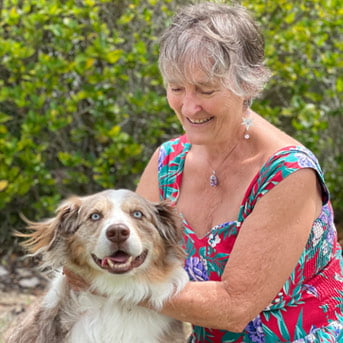Answered by Dr. Christina Chambreau
That is such a great question because we do need to take care of our dog’s teeth. Teeth problems can lead to gum problems, gum infections, and this can then lead to many health problems throughout the body including problems in different organs.
Brush Your Dog’s Teeth
It is very important to train your pup to absolutely love having you brush their teeth. Now, it might be just with your finger at the beginning. It might be taking a little piece of gauze at the beginning and cleaning like that. You may want to experiment with different pet toothpaste, baking soda, sea salt, and pet essential oils to help brush your dog’s teeth. Even tea, green tea, and black tea can be used to rub on the teeth and on the gums. Finally, you can introduce a small toothbrush and see if they’ll tolerate that while you’re training them.
You want to get to the point where they absolutely love having you do things like this. Open the mouth, look way in the back of the mouth, not just lifting the gums, but have them really love having you examine their mouth. Sometimes that can save you from a major problem if something is stuck in the mouth and other times it simply allows you to more deeply evaluate the health of the teeth. So, to prevent future problems this is an excellent way to care for your dog’s teeth.
Gnaw on Raw Meat
Many people who feed their dog a raw meaty bone diet discover that their dog’s teeth never need brushing. Feeding big hunks of raw meaty bone to your dog, depending on their size, can help resolve any mouth or dental diseases.
For instance, for a tiny dog, it might be just a small chicken neck and, as they gnaw on this chicken neck, they’re cleaning their teeth and they’re strengthening the teeth in the jaws as well. For a larger dog, they might chew on a beef rib bone, a whole turkey back, or a big hunk of Chuck steak. For those smaller dogs, they might chew on a big piece of heart. These are definitely different possibilities that you can use that will help keep the teeth clean so you won’t need to brush them as often or maybe never.
Improve Gut Health
One key to good dental health is to have a healthy microbiome. If the gut is full of the right bacteria then the mouth will also have these good bacteria in it. Feeding a fresh wholesome diet will promote your dog’s gut health and that will then prevent the build-up of plaque and tartar on the mouth.
Professional Cleanings by Your Veterinarian
Well, what about regular dental cleanings like you get? What about having your dog’s teeth cleaned on a regular basis? There are two kinds: there are non-anesthetic cleanings and anesthetic cleanings. There’s a lot of debate about which one is best. I personally know veterinarians who I respect and who are experts in the dental field who like one or don’t like one. So, it’s something for you to research and decide.
It is important that you make sure your veterinarian does a very good mouth exam on your dog at your annual exam. All of this will allow you to have a dog with fresh breath and pearly white teeth.
I’m Dr. Christina Chambreau, licensed veterinarian, and on the faculty of Holistic Actions!.
Suggested Treatments:
- Hunks of raw meat/raw meaty bones
- Brushing
- Regular dental cleaning if needed
Related Symptoms:
- Brown stains on the teeth
- Thick build up of Calculus
- Red gums
DISCLAIMER: Holistic Actions! does not provide advice on certified medical treatments. Content is intended for informational purposes only and to equip you with the tools needed for Holistic Medical Decision Making (HMDM). It is not a substitute for clinical assessment, diagnosis, or treatment. Never use content found on the Holistic Actions! website as the basis for ignoring advice from your veterinarian to seek treatment. If you think you may have a veterinary emergency, please call your vet or an animal hospital immediately.

Dr. Christina
Christina Chambreau, DVM, is an internationally known homeopathic veterinarian and associate editor of the Integrative Veterinary Care Journal, she’s written several books on animal healthcare.
After opening her own homeopathy veterinary practice in 1983, she founded the Academy Of Veterinary Homeopathy and was on the faculty of the National Center for Homeopathy Summer School for ten years.
Dr. Christina is also an integrative medicine adjunct faculty liaison for the Maryland Veterinary Technician Program and lectures on a wide array of topics including integrating holistic options into veterinary practices, as well as guidance on how to choose the best approaches to heal animals and sustainability.
